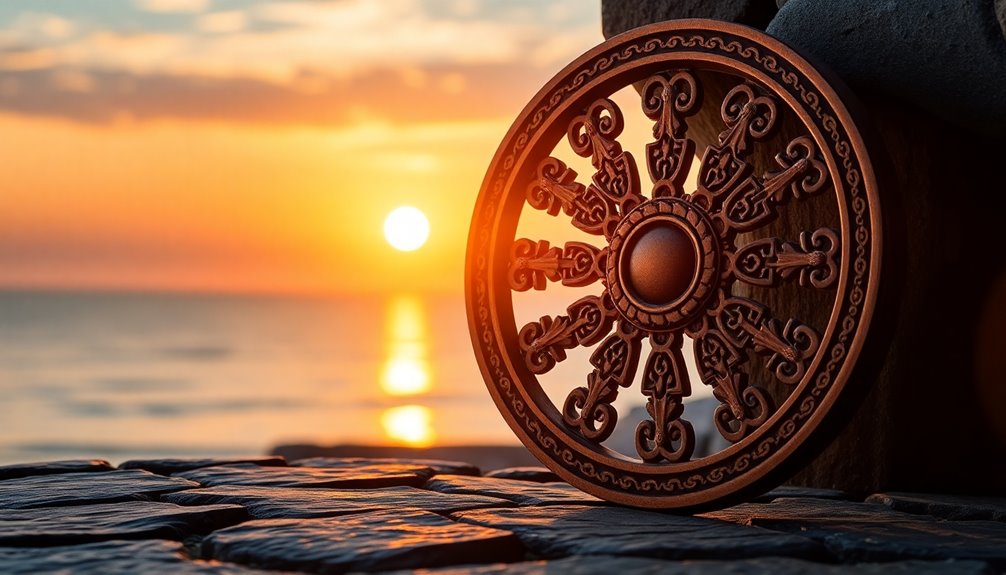In the pursuit of deepening our spiritual connection, it is often said that the first step towards this journey of a thousand miles is seeking the assistance of a spiritual director. Through their compassionate listening and wise counsel, they can assist us in navigating the challenges of our spiritual path.
In this article, we will explore the concept of spiritual direction, the role of a director, the benefits it brings, and how to find the right director for our unique needs.
So, let us take that first step together and embark on a profound exploration of spiritual direction.
Key Takeaways
- Spiritual direction is a one-on-one relationship between a guide and someone seeking to deepen their relationship with a higher power or inner self.
- It focuses on deepening spirituality, not religious doctrine, and can be utilized by individuals of any faith.
- Spiritual directors serve as compassionate listeners and advisors, helping individuals develop a regular spiritual practice.
- Spiritual direction provides numerous benefits, including clarifying spiritual goals, offering support during times of crisis or transition, and fostering self-awareness and clarity of purpose.
What is it?
I’m seeking to deepen my spiritual journey, so I want to understand what spiritual direction is.
From what I’ve learned, spiritual direction is a unique and personalized approach to personal growth and deepening spirituality.
It’s not about following a set of religious doctrines, but rather about connecting with a higher power or inner self in a way that is meaningful to each individual.
There are different approaches to spiritual direction, depending on one’s beliefs and traditions.
The spiritual director serves as a compassionate guide, offering support and insight as I explore my faith and spirituality.
This process can help me develop a regular spiritual practice and gain a deeper understanding of myself and my relationship with the divine.
I’m excited to embark on this journey and discover the transformative power of spiritual direction.
Role of a Director
The spiritual director guides individuals on their path of spiritual growth and provides empathetic support and insight.
As a spiritual director, my role is to offer supportive guidance as you embark on your journey of deepening your spirituality. I am here to listen to your thoughts, feelings, and experiences as you explore your inner self and connect with your faith.
Together, we will create a safe and non-judgmental space where you can freely express yourself and delve into the depths of your spirituality. Through our conversations, I aim to provide you with insight and reflection that will help you gain a deeper understanding of yourself and your relationship with the divine or your inner self.
My goal is to accompany you on this transformative journey, offering support and guidance along the way.
Benefits
One fascinating statistic to consider is that a study found that individuals who engage in spiritual direction experience a significant reduction in anxiety and an increase in positive emotions. This highlights the profound impact that spiritual direction can have on our personal growth and emotional well-being.
Through the guidance of a spiritual director, we are able to explore our inner selves and deepen our connection with the divine or our inner essence. This process of self-exploration and self-discovery can lead to greater self-awareness and clarity of purpose. It provides a safe and non-judgmental space for us to explore our personal spirituality, fostering a sense of trust, safety, and empathy.
Spiritual direction also offers ongoing support during times of crisis or transition. It serves as a source of inspiration and motivation, helping us remain committed to our spiritual practices and community. It enhances our relationships with ourselves and others, deepening our sense of connection and belonging. Overall, spiritual direction is a transformative journey that brings about profound personal growth and emotional well-being.
| Benefits of Spiritual Direction |
|---|
| Clarifies spiritual goals |
| Provides support during crisis or transition |
| Enhances relationships with oneself and others |
| Fosters self-awareness and clarity of purpose |
Finding a Director
When looking for a spiritual director, it is important to seek recommendations from trusted sources and consider different types of sessions that align with your needs and preferences. Finding the right spiritual director is a deeply personal and transformative journey.
Here are some key considerations to evaluate compatibility and ensure a fruitful relationship:
-
Evaluate Compatibility: Take the time to meet with potential spiritual directors and see if there is a connection. Trust your intuition and choose someone who resonates with you on a personal and spiritual level. Compatibility is crucial for building a trusting and supportive relationship.
-
Importance of Trust: Trust is the foundation of spiritual direction. It is essential to find someone who creates a safe and non-judgmental space for exploration. Look for a spiritual director who embodies trust, safety, and empathy. Trust allows for vulnerability and deepens the healing and growth process.
-
Cultural and Spiritual Background: Consider finding a spiritual director who reflects your cultural or spiritual background. Shared cultural or spiritual experiences can enhance understanding and facilitate a deeper connection.
-
Experience and Wisdom: Look for a mature spiritual director with experience and wisdom. Their knowledge of various spiritual practices and traditions can enrich your own spiritual journey.
Remember, finding the right spiritual director is a personal decision. Trust yourself and the process, and let your inner guidance lead the way.
History and Origins
Throughout history, spiritual direction has evolved and been influenced by various religious traditions. Its ancient roots can be traced back to the practices of the Desert Fathers in early Christianity. These early spiritual directors sought to guide individuals in their quest for a deeper connection with the divine.
Over time, spiritual direction has been shaped by the teachings and practices of different religious traditions, including Buddhism, Hinduism, and Sufism. Each tradition brings its unique perspectives and approaches to the spiritual journey. The influence of these traditions has enriched the practice of spiritual direction, providing individuals with a diverse range of tools and insights to explore their spirituality.
Today, spiritual directors draw from this rich tapestry of religious traditions to offer guidance and support to seekers on their spiritual path.
Definition and Concept
I am seeking a guide who can help me deepen my relationship with a higher power or inner self through spiritual direction.
I believe that spiritual direction is a powerful tool for understanding the process of deepening my spiritual journey.
It is not about religious doctrine, but about building a spiritual practice that resonates with my beliefs and values.
Through spiritual direction, I can explore different spiritual practices and traditions that align with my inner self.
This process will help me develop a regular spiritual practice that brings me closer to my higher power and cultivates a deeper sense of connection.
With the guidance of a compassionate and knowledgeable spiritual director, I can navigate my spiritual journey with clarity and purpose, finding inspiration and motivation along the way.
Spiritual Practices
Engaging in spiritual practices with the guidance of a spiritual director can lead to a 35% increase in feelings of connection and a deeper sense of purpose. When we embark on a spiritual journey, it is essential to explore various practices that can help us cultivate inner peace and strengthen our connection with the divine or our inner selves. Spiritual practices can take many forms, such as meditation, prayer, journaling, and contemplative reading. These practices allow us to quiet our minds, listen to our inner wisdom, and connect with a higher power. With the support of a spiritual director, we can navigate these practices with guidance and insight, deepening our understanding of spirituality and its impact on our lives. Through exploration and dedication to these practices, we can find solace, clarity, and a renewed sense of purpose.
| Spiritual Practices | Description | Benefits |
|---|---|---|
| Meditation | Cultivating a focused and calm mind through mindfulness or other techniques. | Reduces stress, increases self-awareness, and enhances overall well-being. |
| Prayer | Communicating with a higher power through words, thoughts, or intentions. | Provides comfort, guidance, and a sense of connection with the divine. |
| Journaling | Reflecting on thoughts, emotions, and experiences through writing. | Promotes self-reflection, emotional processing, and personal growth. |
| Contemplative Reading | Engaging with spiritual texts or sacred writings in a reflective and intentional manner. | Expands knowledge, deepens understanding, and inspires transformative insights. |
Frequently Asked Questions
How long does a typical spiritual direction session last?
A typical spiritual direction session usually lasts around 60 minutes. This length allows for in-depth exploration and reflection. The benefits of longer sessions include a deeper connection with the spiritual director and more time for meaningful discussions and insights.
Can spiritual direction be done remotely or online?
Yes, remote spiritual direction and online spiritual guidance are both possible. Through virtual platforms, individuals can connect with a spiritual director from anywhere, allowing for guidance and support on their spiritual journey.
Is there a specific age requirement or restriction for seeking spiritual direction?
There is no specific age requirement or restriction for seeking spiritual direction. People of all ages can benefit from guidance and support in deepening their spirituality and exploring their faith.
Are there any potential risks or challenges associated with spiritual direction?
When exploring spiritual direction, it’s important to be aware of potential risks and challenges. Building trust and maintaining boundaries are crucial. However, the benefits of personal growth and deepened spirituality outweigh the potential challenges.
Can someone have more than one spiritual director at the same time?
Yes, someone can have more than one spiritual director at the same time. Each director brings unique perspectives and insights, allowing for a broader range of guidance and support on the spiritual journey. Finding multiple sources of guidance can be enriching and beneficial.
Conclusion
In conclusion, deepening our spiritual journey through spiritual direction can be a transformative and rewarding experience. By working with a compassionate guide, we can explore our relationship with a higher power or inner self, clarify our spiritual goals, and enhance our emotional and mental well-being.
While some may question the need for spiritual direction, it is important to remember that it is not limited to a specific faith or denomination and can be beneficial for individuals of any background. Embracing this practice can lead to a deeper understanding of ourselves and a more meaningful connection with the divine.










